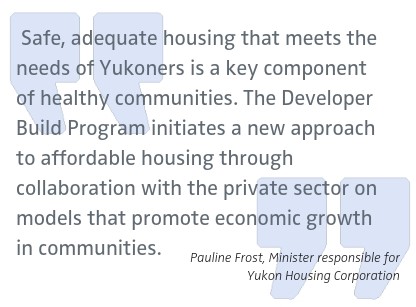2018 has seen a significant amount of change and investment in social, non-profit, and affordable housing across the country.
In the context of a dynamic and changing housing policy framework across the country, the 2018 Affordable Housing Budget Expenditure Highlights in Canada report examines the commitments made by provinces and territories in their respective 2018-2019 budgets and highlights recent housing announcements and initiatives underway within specific provinces and territories.
Although it is not meant to be exhaustive of all measures and policies directly impacting the social, non-profit, and affordable housing sector, the aim of the report is to provide a snapshot of budgetary and related housing developments thus far in 2018, and where possible, offers a glimpse into expected high level housing policy developments in each jurisdiction.
It should also be noted that in November 2017 the federal government released the National Housing Strategy, which contained $40 billion in investments in affordable housing over the next 10 years.
A number of measures contained in the Strategy require cost-matching from provinces and territories. In April 2018, federal, provincial and territorial Ministers responsible for housing (with the exception of Québec) endorsed a multilateral Housing Partnership Framework. Bilateral agreements have begun to be signed, which will specify how provinces and territories will deliver and cost-match federal funds for National Housing Strategy programming.
Social and Non-Profit Housing Units by Canadian Jurisdiction
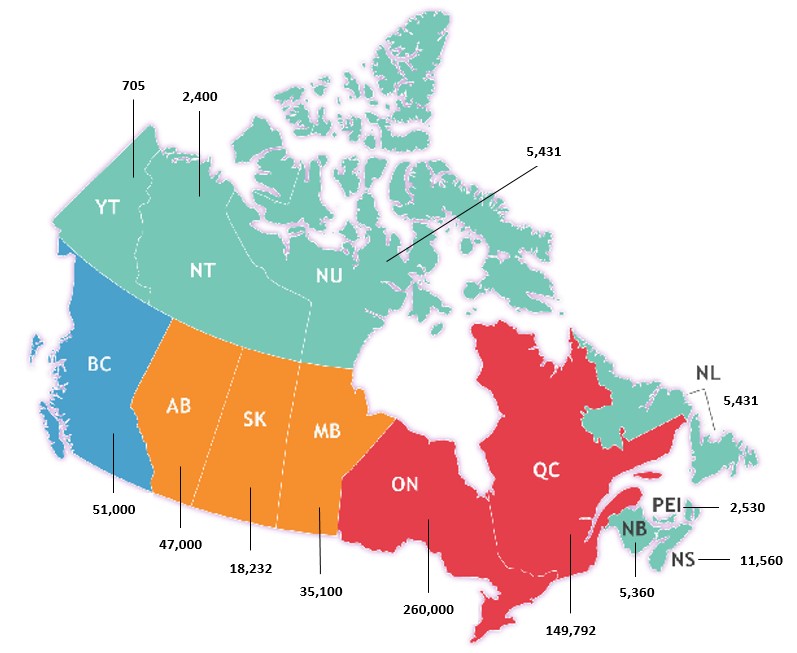
Newfoundland and Labrador
Budget 2018-2019 Expenditure Highlights
While no new major funding investments were committed directly to housing above existing annual Departmental budgets, the government
reallocated funding to several housing and homelessness initiatives and projects, including:
- $10.2 million for maintenance, repair and upkeep of public housing properties, with $3.6 million allocated to modernize and renovate public housing
- $8.6 million for the Supportive Living Program and the Provincial Homelessness Fund which partners with the community sector to prevent homelessness
- $11.8 million to support initiatives and non-profit groups engaged in the delivery of transitional and emergency housing for those fleeing domestic violence Increase funding by $2 million for the Rent Supplement Program to increase the number of rent supplement units and to support the portable rent supplement pilot program
- An additional $2.7 million investment to leverage federal funding under the Investment in Affordable Housing Agreement
The Government’s
budget speech also committed to building new housing units in partnership with the federal government through private and non-profit sector stakeholders, focusing on increasing the existing stock of social housing and reducing wait lists.
Investment in Affordable Housing
The Governments of Newfoundland and Labrador and Canada provided conditional approval in July 2018 to cost-share the development of 93 new affordable housing units throughout the province, including 13 fully accessible units. The $6 million investment through the Investment in Affordable Housing will bring the total of new affordable units created through agreement since 2003 to 1,700.
What to look out for
The Government of Newfoundland Labrador launched their “The Way Forward” plan in 2016 which outlined a vision for sustainability and growth in the province. As part of this plan, the government committed to a review of the Newfoundland and Labrador Housing Corporation’s programs and services.
Following a consultation process, including a tenant survey and stakeholder roundtables, the Corporation released a ‘
what we heard’ document in 2017. Areas of concern raised focused on accessibility; the inclusion of supports for homeless individuals facing mental health challenges; the long-term sustainability of social housing; the need for more affordable housing construction; and increasing clear and direct communications with tenants and social housing applicants to avoid evictions and ensure waitlists are managed in a manner that is easily understandable.
Using the feedback from the consultation process, the Corporation has committed to developing a comprehensive Provincial Housing Plan by spring 2020. The Corporation also released a
Strategic Plan 2017-2020 which sets goals and priorities, including modernizing and improving the utilization of public rental housing stock to ensure its long-term sustainability.
Infrastructure Investments
In 2017, the province released a five-year, $2.5 billion
action plan aimed at addressing infrastructure priorities in educational institutions, healthcare facilities, roads and bridges, justice facilities, municipal infrastructure, and affordable housing. The plan earmarked $86.5 million for repair, maintenance and modernization of affordable housing units with funding to be spread from 2018-2023. Further details have not been unveiled.
Prince Edward Island
Budget 2018-2019 Expenditure Highlights
While no new major funding investments were committed directly to housing above existing annual Departmental budgets, the government
reallocated funding to several housing and homelessness initiatives and projects, including:
- $17 million over two years (2017-2018 and 2018-2019) to build and sustain affordable housing supply, provide rent supports and reduce chronic homelessness
- $3 million for the Community Housing Fund to deliver innovative housing solutions through engagement and collaboration with community partners
- $1.8 million to complete capital renovations for 1,500 family and senior housing units
- $2.3 million to create transitional housing
- $5.95 million to create and maintain seniors housing units
- $500,000 budgetary increase in support of shelter allowances
In 2017-2018 the province spent $7.1 million to complete capital renovations in the province’s 1,500 family and senior housing properties; provided monies to five non-government organizations to fund existing supportive housing and created 18 new units of specialized residential housing; and, implemented a Seniors Independence Initiative to support ageing in place.
Housing Action Plan
In July 2018, the government released an
action plan on affordable housing. The plan was developed with a team of housing experts and clients and included a broader engagement process with Islanders. A housing supply task force was also established to inform the work and identify innovative approaches to address housing challenges across the province.
The 2018-2023 Action Plan establishes five goals (availability of diverse housing options; affordability; sustainability; coordination of service; build governance) with a long-term commitment of creating 1,000 new affordable units over the next four years. Immediate commitments include creating:
- 275 affordable housing units in 2018
- 10 transitional housing units in 2018 to support Islanders with mental health needs as they transition back into community life
- 74 new seniors’ units by spring 2019
- Up to 10 new transitional housing units by spring 2019 to support victims of family violence and for children who have aged out of the province’s child protection services
- 100 new private nursing home beds by summer 2019 to further improve access to long- term care for Island seniors
The Action Plan also contains an affordable housing loan fund and a down payment assistance program. The down payment program will provide a no-interest loan of up to five per cent of a home’s purchase price for “modest income” Islanders and should be in place by fall 2018.
Nova Scotia
Budget 2018-2019 Expenditure Highlights
While no new major funding investments were committed directly to housing above existing annual Departmental budgets, the government
reallocated funding to several housing and homelessness initiatives and projects, including:
- $5.5 million to help seniors stay in their homes longer, including more home care support and expanding the Caregiver Benefit program
- $16.2 million increase in Disability Support program to help more people move out of institutions, to improve respite care, and to fund more complex client cases
- $2.1 million to help create eight small options homes and two community options homes
- $12.4 million dedicated to improving the current stock of public housing
Budget Address
When the current government took office in 2013, cutting the wait list for affordable housing was a top priority. In their first term, they reduced that wait list by 20 per cent. In the
2018-2019 Budget Address, the province committed to further wait list reductions of 30 per cent over the next three years through the investment of new rent supplements to help up to 1,500 people who are on wait lists for public housing pay for units owned by the private or non-profit sectors.
The new program will cost $18 million and will almost double the number of rent supplements across the province from the current 1,700. Eligible program participants will put 30 per cent of their income toward rent with the supplement covering the remaining balance.
In addition, under the Poverty Reduction Blueprint, the province will invest $100,000 for a one-year pilot project to address youth homelessness in Sydney. Housing Nova Scotia also invested $114,000 over two years for the Cape Breton Community Housing Association to hire a housing support worker to focus on adults at risk of or experiencing homelessness.
What to look out for
Housing Nova Scotia is developing a portable rent supplement pilot project which will see rent supplements attached to an individual rather than a specific dwelling. The project is expected to begin by the end of 2018.
In 1996, municipalities across Nova Scotia gave up their responsibility for housing and social security with proponents of what is called the Service Exchange arguing that services such as housing have benefits beyond individual communities, and that the government should ensure quality of essential services do not differ across the province. Following uploading of housing from municipalities to the province in 1996, the City of Halifax is considering taking back responsibility of delivering housing. The Halifax Regional Council recently approached the province with a report outlining the idea to develop an arm’s length body that would manage public housing (including maintain existing stock), support the non-profit sector, and build 5,000 new units. The province has yet to respond to the request from the Halifax Regional Council.
New Brunswick
Budget 2018-2019 Expenditure Highlights
While no new major funding investments were committed directly to housing above existing annual Departmental budgets, the government
reallocated funding to several housing and homelessness initiatives and projects, including:
- Tabling the Intimate Partner Violence Intervention Act to provide victims of domestic violence with additional tools to increase their safety
- $800,000 to begin implementing action items identified in the Aging Strategy, including items aimed at seniors aging in place
National Housing Strategy
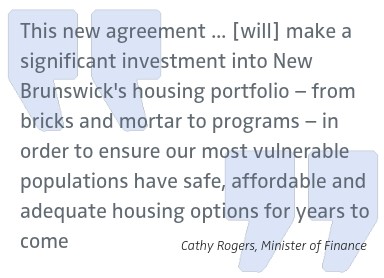
The Governments of New Brunswick and Canada signed a 10-year cost-sharing bilateral agreement in July 2018 that will invest nearly $299.2 million to protect, renew and expand social and community housing, and support housing repair, construction, and affordability. This new funding is in addition to more than $147 million previously planned federal housing investments in New Brunswick through the Social Housing Agreement over the next 10 years. These combined investments aim to preserve the 9,000 community housing units in New Brunswick.
What to look out for
The current government has committed to develop a three-year housing action plan, beginning in 2019-2020, setting targets and outlining how it will use federal and cost-matched funding to meet provincial housing needs. However, the results of the general provincial election set for September 2018 may shift housing priorities.
Québec
Budget 2018-2019 Expenditure Highlights
With total spending in fiscal year 2017 of $1.07 billion, the Government of Québec, through the Société d’habitation du Québec, has one of the highest public housing budgets in the country. While no new major funding investments were committed directly to housing above existing annual Departmental budgets for 2018, the government reallocated funding to several housing and homelessness initiatives and projects, including:
- $431 million to facilitate access to affordable housing
- $230.7 million for the construction of 3 000 new social housing units
- $43.0 million toward granting a rent supplement for a portion of the new units
- $72.0 million for programs aimed at improving housing conditions for low-income households or those with special housing needs.
- $25.0 million to the Residential Adaptation Assistance Program.
- $20.0 million to low-income rural owner-occupants to make renovations
- $2.0 million to the Shelter Enhancement Program.
10 per cent of the planned new builds will be reserved for people who are homeless or at risk of homelessness and people with mental health issues. An additional 100 units will be set aside for projects related to shelters for women fleeing domestic violence. The 3,000 new housing units announced in the budget will raise the social, community and affordable housing stock in the province to a total of 152,792 units.
The budget will also invest $5.2 million for 225 new housing units under the Rent Supplement Program for private rentals. The program enables households to live in private sector dwellings and pay a rent equal to 25 per cent of their income. 150 units will be reserved for people who are homeless.
National Housing Strategy
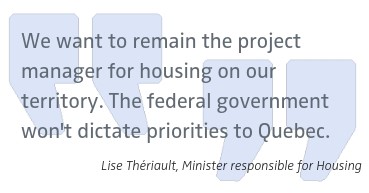
Québec did not endorse the multilateral Housing Partnership Framework, preferring to negotiate a funding agreement outside the national program so the province can continue to run housing,
stating that: “While it shares many of the objectives sought by other governments, Québec intends to fully exercise its own responsibilities and control over the planning, organization and management of housing on its territory to benefit Québec’s population. Accordingly, Québec does not subscribe to the National Housing Strategy and hopes to undertake as soon as possible discussions to reach an asymmetrical bilateral agreement, distinct from the Strategy, which will fully respect Québec’s exclusive responsibility in the area of housing and allows Québec to obtain its share of all federal funding dedicated to housing.”
Strategic Plan
The Société d’habitation du Québec’s
2011-2016 Strategic Plan was extended until 2017 and met 13 of its 14 objectives, including delivering new rental housing in Nunavik and adapting 10 000 units for greater accessibility for persons with disabilities. Following a public consultation process and evaluation of results attained in the previous Plan, a
2017-2021 Strategic Plan focused on innovation and reducing barriers to accessing services was unveiled. The new Plan sets similar measurable objectives such as funding for innovative projects, cutting red tape and increasing navigation services for persons accessing various social services, and better data gathering and knowledge transfer.
Ontario
Budget 2018-2019 Expenditure Highlights
Several
new funding investments were committed directly to housing above existing annual Departmental budgets, including:
- $2.1 billion over four years to increase the level of care and access for mental health and addictions services, including supportive housing with targeted services for Indigenous, racialized, and LGBTQ communities.
- Of this new investment, $425 million will go to provide 2,475 additional supportive housing units over four years to reduce homelessness and prevent recidivism for people in frequent contact with the justice system. This includes 525 newly built units for people with complex mental health and addictions needs to help ensure they can continue to receive the services and supports they need
In addition, the government reallocated funding to several housing and homelessness initiatives and projects, including:
- $547 million over five years for repairs and retrofits to help support the energy efficiency and long‐term sustainability of social housing buildings
- $3 million to establish a Cooperative Housing Development Fund to create new, mixed-income cooperative housings. The fund will facilitate proposal development for projects that could leverage federal funding
- $5.8 million over three years to Habitat for Humanity to establish a Build Factory in Burlington. At this facility, components for safe, decent and affordable homes will be assembled and transported to as many as 120 Habitat for Humanity construction sites across Ontario
The government is also helping seniors who cannot afford to live independently and require assistance with health care or daily activities such as bathing or meal preparation, by providing 200 new rent subsidies to provide access to affordable housing, as well as home and community care.
National Housing Strategy
The Governments of Ontario and Canada signed a 10-year cost-sharing bilateral agreement in April 2018 that will invest nearly $4.2 billion to protect, renew and expand social and community housing, and support housing repair, construction, and affordability.
A New Ontario Government
With the new Ford government in Ontario, it is premature to know what course this government will take with respect to social and non-profit housing. Funding for cost-sharing programming under the federal National Housing Strategy is expected to roll out in April 2019; however, Premier Ford’s Speech from the Throne announced the launch of a Commission of Inquiry into the government’s financial practices and a line-by-line audit of all government spending.
During the campaign, Premier Ford did commit to increasing the supply of affordable housing in the Greater Toronto Area and allocating $3.8 billion in new support for mental health and addictions, including supportive housing over the next 10 years.
Although no further details on affordable housing campaign commitments under the new government have been released, other announcements in relation to cap-and-trade will affect the social and non-profit housing sector. Premier Ford has taken steps to c
ancel Ontario’s Cap and Trade initiative, where tax proceeds were reinvested in environmentally friendly projects such as public transit or energy-saving renovations to buildings. For Ontario, this means that the majority of funds that were allocated to energy repairs and retrofits in the social housing sector will no longer be available.
Manitoba
Budget 2018-2019 Expenditure Highlights
While no new major funding investments were committed directly to housing above existing annual Departmental budgets, the government reallocated $7 million of existing budget to index RentAssist to 75 per cent of median market rates. RentAssist is a portable rent supplement program for low-income individuals and families.
Effective July 2018, changes to the RentAssist program will see recipients who are not on social assistance contribute 30 per cent of their income toward rent, up from 28 per cent. This is the second consecutive year that the government has made changes to the program, with the contribution threshold at 25 per cent when the government took office in 2016. The program is intended to help pay housing costs for low-income and social assistance households. Of the 32,000 households that use the program, 25,000 are on social assistance.
It is also worth noting that while the 2018 budget highlights a $7 million increase to the housing budget, there was a $20 million decrease in Budget 2017, making the 2018 housing budget still lower than 2016.
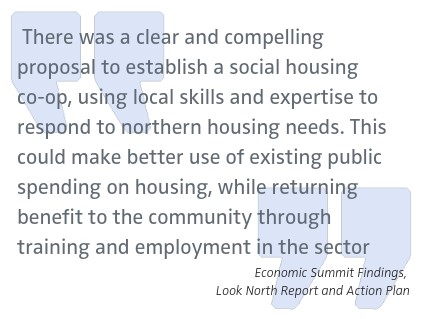
What to look out for
The Look North Report and Action Plan for Manitoba’s Northern Economy report identifies six priority areas aimed at developing the province’s North. Included in the priority areas is addressing housing challenges and opportunities such as the development of a northern Manitoba Housing Network of community based social housing providers and other stakeholders to discuss best practices in social housing management and availability of resources, as well as a regulatory and policy review to address housing barriers. A northern steering committee and joint action group on housing has been established to lead and engage stakeholders in the next phase of work to develop more detailed strategies and action plans. No further details or timelines have been released.
Provincial Housing Strategy
Province-wide consultations to inform the development of a new Provincial Housing Strategy were conducted between October 2016 and March 2017. Over 1,500 Manitobans responded and a ‘What We Heard’ report was released in February 2018. A “Made in Manitoba” Provincial Housing Strategy is underway.
Saskatchewan
Budget 2018-2019 Expenditure Highlights
No new major funding investments were committed directly to housing above existing annual Departmental budgets.
In July 2018 the Governments of Saskatchewan and Canada co-invested $6.7 million to deliver more affordable housing in the province, including the construction of 53 affordable housing units through seven projects in seven communities. Projects are aimed at vulnerable households including seniors in the north; pre- and post-natal women living with or at risk of HIV; individuals with complex needs and mental illness; and Indigenous Peoples facing homelessness. The initiative is expected to reduce homelessness in the province by 50 per cent.
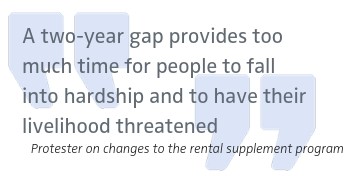 Rental Housing Supplement
Rental Housing Supplement
As part of a broader review on social programs and services, the government suspended the intake of new applications to the Saskatchewan Rental Housing Supplement as of July 2018. The government will be co-developing a new rental support program with the federal government through National Housing Strategy programming but is not expected to be in place until 2020. This change will not affect eligible households currently in receipt of the benefit. The government cited high vacancy rates in government-owned social housing units as rationale for the program change and is expected to save $5 million in spending for 2018-2019.
Alberta
Budget 2018-2019 Expenditure Highlights
While no new major funding investments were committed directly to housing above existing annual Departmental budgets, the government
reallocated funding to several housing and homelessness initiatives and projects, including:
- $197 million for Homeless and Outreach Support Services
- Support more than 100 new permanent supportive housing spaces, including 28 homeless shelters, 30 women’s emergency shelters, 12 second-stage shelters, and trauma informed programming serving women and children leaving family violence.
- $256 million, delivered through the Alberta Social Housing Corporation, to support the 47,000 households in securing affordable housing including:
- $132 million for family and seniors’ housing
- $68 million towards rental assistance
- $16 million targeted towards special needs housing
- $12 million in maintenance and renewal funding for Housing Management Bodies across the province
- $25 million allocated over three years to deliver the Affordable Housing Energy Savings Program, which will enable retrofits in affordable housing units
Provincial Affordable Housing Strategy
The government launched a five-year, $1.2 billion
affordable housing strategy in 2017 aimed at building 4,100 affordable housing units and updating the current stock of affordable housing. The government will also pilot mixed-income models to allow tenants to pay an adjusted rent, so they can choose to stay in their homes if their incomes increase over the low-income limit.
The Strategy sets specific targets – such as ensuring all seniors and tenants in affordable housing have access to a tenant support worker and all newly constructed government-owned and -supported units meet industry standards for environmentally friendly and energy efficient design by 2020-2021. The Strategy also sets less tangible targets – such as maintaining a Facility Condition Index rating of “Good” or “Fair” for more than 95% of government-owned and -supported housing stock and increasing the number of Albertans who say the affordable housing system meets their needs and helps them achieve their goals as measured through improved data collection. Details on measuring the Strategy’s success and bolstering data collection have yet to be released. The government announced in spring 2018 that it would not meet its five-year target and has extended the timeline by two years.
Indigenous Housing
The
government launched a $120 million Indigenous Housing Capital Program in June 2018 aimed at increasing the supply of off-reserve, non-market, affordable rental housing units for Indigenous peoples in need. The program reflects key findings of a province-wide listening tour with Indigenous and Indigenous-serving organizations, focused on creating culturally-appropriate housing that accommodates multi-generational housing, with communal spaces for meetings and ceremonies, close to wraparound supports like schools, transit, and health services. Funding will be spread over five years, with housing designed and delivered by Indigenous governments or organizations.
British Columbia
Budget 2018-2019 Expenditure Highlights
Significant
new major funding investments were committed directly to housing above existing annual Departmental budgets, with $6.6 billion over ten years to create 114,000 affordable housing units in urban and rural areas.
Housing was a cornerstone feature of the province’s budgetary priorities with both new monies committed and the release of a
30-point action plan. The new monies represent the largest capital investment in housing in the province’s history. To pay for it, the government is relying on new tax measures, including an expanded and increased foreign buyer tax, a speculation tax and a property transfer tax which they hope will also curb housing speculation and ease housing shortages in the province.
In terms of social and non-profit housing, the plan outlined the following investments:
- $141 million over three years and $734 million over the next ten years to build units for women and children fleeing domestic violence
- $1.2 billion over ten years to building 2,500 new supportive homes for people struggling or at risk with homelessness
- $116 million over three years to increase rental assistance programs
- $1.1 billion over ten years to modernize existing affordable housing stock, including increasing energy efficiencies
National Housing Strategy
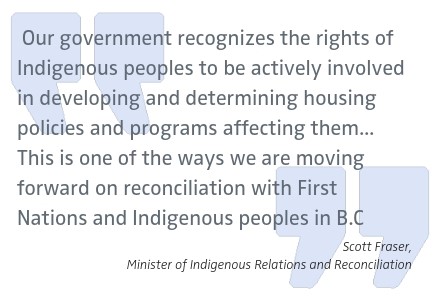
The Governments of British Columbia and Canada signed a 10-year cost-sharing bilateral agreement in July 2018 that will invest $990 million to protect, renew and expand social and community housing, and support housing repair, construction, and affordability.
Indigenous Housing
Announced in June 2018, through the new
Building BC: Indigenous Housing Fund, the government is investing $550 million over the next ten years to build and operate 1,750 new units of social housing in urban and on-reserve areas. The new housing will be developed in partnership with the Aboriginal Housing Management Association, Indigenous housing societies, and First Nations, with the government placing emphasis on creating partnerships with Indigenous Peoples.
Yukon
Budget 2018-2019 Expenditure Highlights
While no new major funding investments were committed directly to housing above existing annual Departmental budgets, the government
reallocated funding to several housing and homelessness initiatives and projects, including:
- $1.5 million for housing projects with First Nations
- $39.7 million investment in housing and new building lots
- $6 million for affordable housing
- $2.7 million for a Housing First residence for vulnerable people
- $8.9 million to improve existing housing
- $1.8 million to plan and develop rural lots
In March 2018 the government transferred $750,000 to the Challenge Disability Resource Group for the purchase of vacant land to build a 53-unit building with a mix of affordable, supportive and market housing in Whitehorse. The Cornerstone Affordable and Supportive Housing Development will contribute to the diversification of housing options in the territory, including long-term housing for individuals experiencing homelessness and people with moderate disabilities or mental illness.
Developer Build Program
Through this program, the government will provide $2 million dollars over three years for short-term construction financing to provide development contractors and First Nations’ low interest loans for short-term, project-ready constructions of affordable housing. The intent is to increase the quality and quantity of housing options in the territory, especially in rural Yukon.
Housing Initiative Fund
The Yukon Housing Corporation launched in May 2018 a five-year, $3.6 million fund for innovative housing projects to address affordable housing needs through new construction or by providing rent supplements for new units. Eligible projects are expected to build a minimum four units in Whitehorse and minimum two units in communities and can be supportive or social housing, new affordable rentals or home ownership options, or other innovative projects like co-housing.
Northwest Territories
Budget 2018-2019 Expenditure Highlights
While no new major funding investments were committed directly to housing above existing annual Departmental budgets, the government
reallocated funding to several housing and homelessness initiatives and projects, including:
- $762,000 for the Yellowknife Sobering Centre to help ensure that there is a safe shelter and safe transportation to that shelter, for intoxicated and homeless people at all hours of the day
- $3.3 million in additional resources to further support income assistance, funding for anti-poverty initiatives
- $3.8 million to cover additional costs for water and sanitation services for public housing
Under the federal government’s Investment in Affordable Housing the Inuvialuit Regional Corporation received $15 million for housing projects in the six Inuvialuit Settlement Region communities. The Inuvialuit Regional Corporation and the Northwest Territories Housing Corporation entered into a joint agreement in February 2018 where the Inuvialuit Regional Corporation will construct new social housing units that will, upon completion, be added to the territory’s public housing inventory.
Nunavut
Budget 2018-2019 Expenditure Highlights
No new major funding investments were committed directly to housing above existing annual Departmental budgets.
Blueprint for Action on Housing
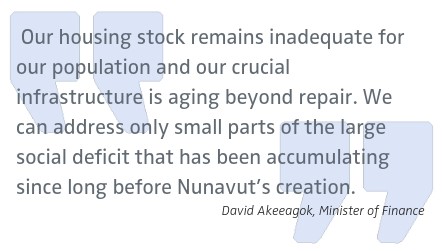
The government is in its second year of implementing its long-term comprehensive
housing and homelessness action plan. The plan recognizes the inadequate social housing stock in relation to the territory’s population and the need for new builds. The cost of maintaining housing in Nunavut is significant and the government, which supports 80 per cent of territorial housing, spends more of its total revenue on housing than any other jurisdiction in the country. 52 per cent of Nunavummiut live in social housing. The government has taken a whole-of-government approach in its action plan, linking housing with other priorities in poverty reduction, health care, and environment. The plan contains four goals and strategic directions, including understanding and defining housing demand factors; removing barriers to the supply of housing; reduce the cost of housing; and increasing investments in housing.
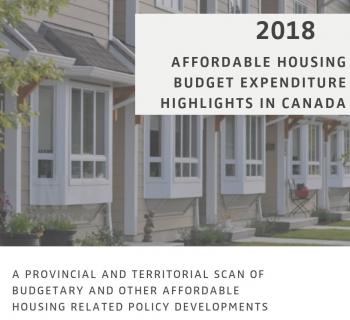

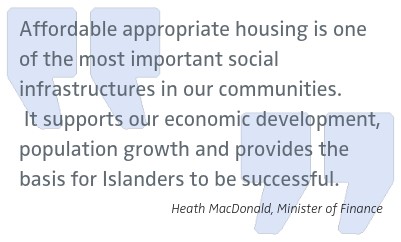
 Québec did not endorse the multilateral Housing Partnership Framework, preferring to negotiate a funding agreement outside the national program so the province can continue to run housing, stating that: “While it shares many of the objectives sought by other governments, Québec intends to fully exercise its own responsibilities and control over the planning, organization and management of housing on its territory to benefit Québec’s population. Accordingly, Québec does not subscribe to the National Housing Strategy and hopes to undertake as soon as possible discussions to reach an asymmetrical bilateral agreement, distinct from the Strategy, which will fully respect Québec’s exclusive responsibility in the area of housing and allows Québec to obtain its share of all federal funding dedicated to housing.”
Québec did not endorse the multilateral Housing Partnership Framework, preferring to negotiate a funding agreement outside the national program so the province can continue to run housing, stating that: “While it shares many of the objectives sought by other governments, Québec intends to fully exercise its own responsibilities and control over the planning, organization and management of housing on its territory to benefit Québec’s population. Accordingly, Québec does not subscribe to the National Housing Strategy and hopes to undertake as soon as possible discussions to reach an asymmetrical bilateral agreement, distinct from the Strategy, which will fully respect Québec’s exclusive responsibility in the area of housing and allows Québec to obtain its share of all federal funding dedicated to housing.” Rental Housing Supplement
Rental Housing Supplement
